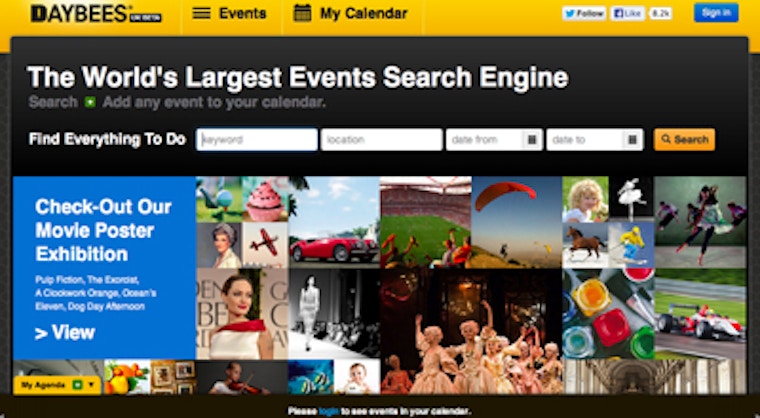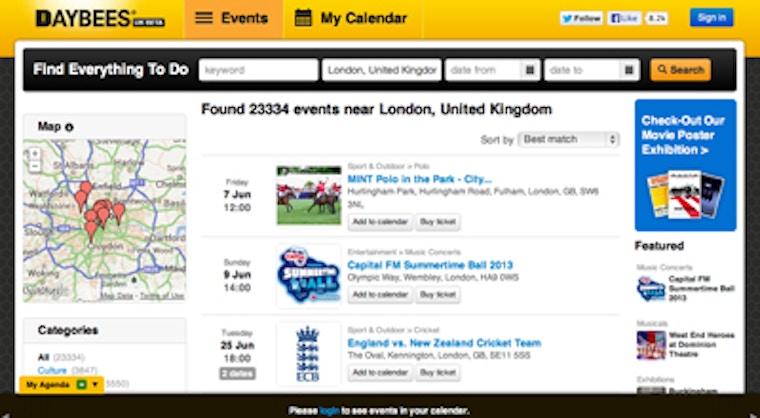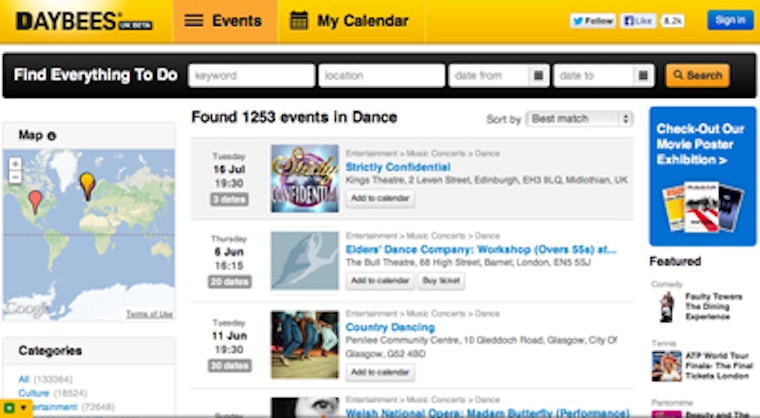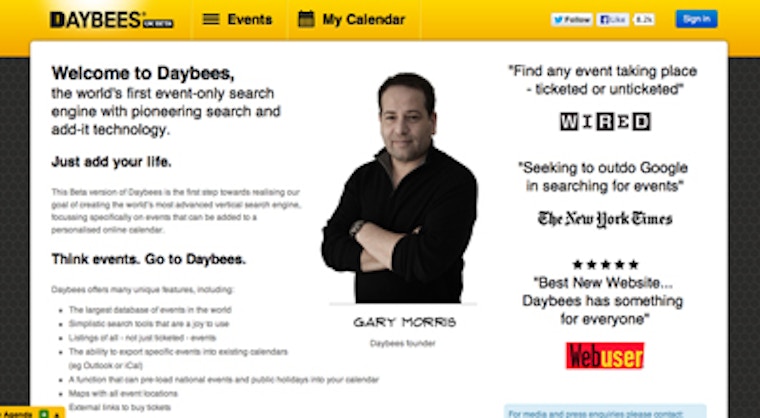
Clearly the answer was yes, because here we are in the heart of Soho ready to put the world of Daybees to rights - but first questions first: how did the former music and television producer come up with such an iconoclastic moniker? Busy bee syndrome is where it all started, a fitting image for a pretty unique concept; ‘I was looking for available names that had some connection to events,’ Morris says. ‘You’ve got YouTube, Google, eBay… so it had to be duo-syllabic. If we would have chosen Event Finder as our name, then we’d never been able to trademark it. If there’s anything I’ve learnt about a brand is that it has to be organic. It has to be something that can develop and grow. It has to be Madonna.’
This quote is classic Morris, talking at the speed of light, eloquently illustrating his manifesto with all manner of similes, metaphors and the most erudite of adjectives. No surprise then that the pre-Daybees years were a rich tapestry of high pressure jobs in the most creative of industries; a colourful curriculum vitae that began when Morris left school to become a pro drummer, touring Europe and playing Wembley arena. ‘It was filmed by the BBC,’ he reminisces. ‘That was the dream I had when I was twelve.’ One thing lead to another and Morris found himself slap bang in the heart of the music industry; as the owner of a recording studio. ‘We turned that into a pretty good going concern and worked with people like Robert Plant, who’s my hero… Jools Holland and Squeeze recorded a couple of albums. People like Dan Aykroyd, Paul Young… it was fantastic.’

As if that wasn’t enough there was a seminal four-year stint creating commercials for Poker Stars.com (the largest online poker site in the world). ‘I worked for the company when it was probably worth a couple of hundred million and left it four years later, worth several billion. That’s a massive, massive campaign. You know you can have ideas, but for them to be able to scale is a whole new board game. I did a lot of movie trailers as well. I worked for Sony Pictures Releasing, Warner Brothers, Paramount Pictures, Virgin, UIP, Universal, EMI, Sony BMG…’ Prior to this, when television beckoned; ‘A producer spotted some of my work. They got me to do a job at Sky Sports Interactive, launching Sky Sports Interactive for Sky. That then got me work at The Discovery Channel. I became Senior Producer and it launched stuff for Discovery Kids, Discovery Wings, Discovery Health, and worked on all the other Discovery brands. Then I was headhunted for Bloomberg.’ (Morris was International Global Creative Director at Bloomberg Television).
So there they are, the years preceding the launch of the ‘big idea’, the passionate stab at carving out a piece of web history and putting the Daybees stamp on it. But what are the most prescient challenges with this kind of venture? ‘Everything,’ is the simple answer, though Morris qualifies this with the following; ‘When you have a blank canvas you have to create your own paint, and your own brush – but you’re creating a new type of brush and a new type of paint. It’s everything. We could have launched the Beta six months ago. But I wasn’t happy with it. I don’t see why I should give my users something that’s secondary and ask them to bear with me. I want them to have something very cool.’

What Daybees offers, certainly lives up to the hype; integrated calendars, a global sweep of independent unbiased events (powered by custom built crawlers), the ability to buy tickets whether it’s a ‘niche, free or ticketed’ event. Even the ‘tour guide’ video is testament to Morris’s skills in TV production with some seriously high jinks graphics and narration. But most pertinent of all perhaps is the ‘next generation calendar’ – marked out by the ability to ‘layer’ events and add them at ‘just a click’. ‘Big to niche, local to global’ is a well versed Daybees tagline – and it’s an ambitious project, but one that has not been without trial over adversity; namely the founder’s bête noire – securing funding; ‘I actually ended up writing to our Prime Minister to explain my frustration in a UK guy coming up with a UK venture, and having something that’s capable of scaling and being a presence in countries. I mean we’ve got an advisor as well who sits as an un-exec guy on the board. So we’re a really well-placed company – and here we are in the UK, not being able to get any help from the government, any funding at all… it’s tough.’
Impassioned by the issue, Morris can’t help but take on the mantle of the entrepreneur battling to raise capital; ‘You approach the banks, the banks that befit billions of pounds to help small business, and they say: ‘Well what’s your revenue?’ ‘Well we’re pre-revenue.’ ‘We’re not interested.’ And you say: ‘Well how do we get to revenue if we’re not funded?’ And they’re like: ‘Well, you’ll have to find a different way to raise it.’ And today’s world is not really a VC world – because VC’s have their place for companies – not necessarily where we are. It’s interesting how the big companies like Facebook and Oracle and Google have taken on that mantle of helping small businesses. I think in the next five years that’s going to play out, it’s very, very interesting.’

Even more topical is Morris’s assessment of web monopolies; ‘Who owns the majority of sites on the Internet?’ he asks rhetorically. ‘It’s interesting when you start seeing different competing brands and you find out they’re all owned by the same people.’ So is this strategy (selling to a bigger concern) a long-term ambition for Daybees itself? ‘We’re always going to be open to offers,’ Morris chuckles. ‘There are so many exciting big companies out there whose passion is online that we’d be daft not to listen to anything.’
‘You know, this goes back to choosing your partners right. Daybees is to be my legacy,’ he says with classic understatement. ‘It’s what I’ve created to be a legacy. Even if it ends up being bought out by somebody and rebranded into a different name. This is something that I really want to live on. I think the person I admire beyond any doubt is Richard Branson. Would Virgin be a good suitor for this? Absolutely yes. But then would Microsoft and would Facebook? Absolutely yes. They’re all good but it all goes back to… it’s a karmic thing. It’s the right time, right place. It just has to be right.’
Interview by Alice Kahrmann.

